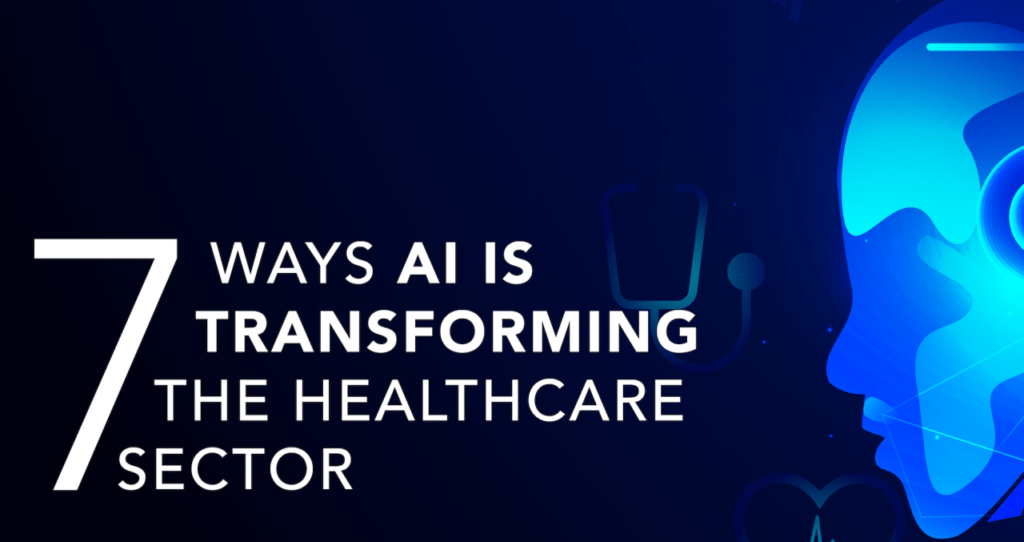
7 Ways Artificial Intelligence is Transforming Modern Healthcare

Artificial intelligence (AI) refers to computer systems that can learn, reason, and accomplish tasks to help humans. AI now plays many roles in assisting doctors, researchers, and patients. This article explains 7 important examples of AI improving medicine through early disease detection, scientific breakthroughs, virtual assistance, precision medicine, operational efficiency, and more.
Table of Contents
- AI-Powered Disease Detection
- Discovering New Treatments
- Virtual Health Assistants
- Facilitating Precision Medicine
- Optimizing Hospital Logistics
- Enhancing Medical Imaging
- Automating Cybersecurity
7 Ways How AI is Transforming Modern Healthcare
AI-Powered Disease Detection
Detecting illnesses early dramatically increases survival rates while cutting healthcare costs. AI programs help analyze symptoms to rapidly and accurately diagnose various diseases, even for athletes who are suffering from career-threatening injuries.
For example, AI can now identify heart disorders, osteoporosis, Alzheimer’s, diabetes, and even some cancers much sooner than human clinicians.
Researchers at Stanford University created an AI model correctly predicting heart failures 9.4 months prior just by scanning retinas during routine physicals.
So rather than waiting until patients report severe discomforts, AI recognizes early subtle clues and patterns to treat conditions or slow down progression preemptively. This saves lives through early interventions.
Discovering New Treatments
Drug research and development require sorting through vast volumes of molecular data to find chemicals that match desired therapeutic properties. This process previously took major manpower, years of testing, and millions of dollars per approved medication.
However, AI tools excel at rapidly analyzing complex biological information and chemical structures. AI can screen billions of molecular combinations against targeted disease criteria to find promising options neglected through manual attempts.
For instance, Insilico Medicine’s AI discovered a preclinical drug candidate for fibrosis in just 18 months – a process traditionally demanding over 5 years.
Their AI amplified and accelerated R&D results better than manual efforts. Soon, AI may drive most new drug innovations.
Virtual Health Assistants
Chatbots and voice-activated virtual assistants instantly equip patients with personalized health information anywhere, often replacing initial doctor visits. They offer accurate symptom checks, triaging to appropriate care levels, telehealth session bookings, and preventative health tips tailored to individuals’ needs.
By early 2023, over half of US healthcare organizations had already used some kind of AI chatbot or voice assistant. These virtual health assistants provide correct symptom assessments 75-90% of the time, with the scope of questions and advice expanding constantly through machine learning.
Virtual assistants also help hospital call centers route inquiries correctly, reduce hold times, and resolve common issues automatically to improve patient experiences through quick, customized self-service.
Facilitating Precision Medicine
Precision medicine promises to customize patients’ healthcare plans based on their unique DNA, environment, lifestyle, and health histories instead of using a generic one-size-fits-all approach.
However, tailoring everything from risk calculations, diagnoses, drug recommendations, doses, and screenings to a person’s distinct biological makeup requires managing and connecting massive amounts of data from genomes to family histories. Determining ideal care paths depends on identifying complex interrelationships within this vast health dataset.
Powerful AI data modeling successfully handles these complex correlations using machine learning algorithms trained on huge patient information pools. By revealing insights manual examination could never unearth, AI paves the way for practical, customized healthcare-enhancing outcomes.
Optimizing Hospital Logistics
Behind vital medical roles, hospital administrative tasks like admissions, discharges, transfers, staff allocation, operating room scheduling, equipment delivery, pharmaceutical dispensaries, and supply chain management comprise nearly 50% of hospital expenditures, according to NEJM Catalyst. Yet outdated processes plague many healthcare facilities, hurting the bottom line.
Luckily, AI radically optimizes hospital logistics through techniques like prescriptive analytics and simulation modeling.
For instance, AI tracking gurney traffic, operating room turnovers, plus patient risk assessments improved surgery scheduling efficiency by over 45% in one study published by Nature Scientific Reports.
This AI solution maximized patient throughput while supporting better staff coordination using data insights instead of feelings.
Enhancing Medical Imaging
Doctors utilize CT scans, x-rays, MRIs, and other complex imaging to identify abnormalities indicating potential illnesses and injuries in patients’ bodies. However, reliably interpreting the nuances within these scans often challenges human cognition despite years of training.
AI imaging analytics helpfully surfaces salient visual disease biomarkers, providing radiologists and oncologists with second, reliable opinions on possible diagnoses and recommending additional patient actions when uncertainties exist.
In recent Stanford studies, AI even outperformed experienced physicians in detecting diseases through medical imaging nearly every time.
Moreover, imaging analytics AI pinpoints just the relevant areas directly on highlighted scans, further optimizing clinical decision-making accuracy and speed. This AI specialty will redefine radiology standards.
Automating Cybersecurity
Telehealth visits, internet-connected devices, and technology transmitting patient information dramatically improve care coordination. But these streams of health data also become targets for hackers, threatening patient privacy and care continuity when breaches occur.
Addressing this, healthcare AI applications help safeguard infrastructure and information dynamically, detecting increasingly sophisticated threats. AI cybersecurity often utilizes techniques like machine learning, natural language processing, and automation to actively neutralize attackers while minimizing reliance on defending specialists.
For example, AI can instantly identify unauthorized data access attempts from suspicious locations and then lock accounts as appropriate to resolve over 90% of common stealth attacks.
AI both fortifies defenses and responds to adversaries far faster through learned self-protection than manual methods.
Key Takeaways
In summary, artificial intelligence positively impacts modern medicine in 7 essential ways:
- Detecting diseases earlier
- Speeding R&D of new treatments
- Providing smart virtual health assistance
- Enable precision care customization
- Streamlining hospital operations
- Improving medical imaging accuracy
- Securing patient data
Final Word
AI makes clinicians’ jobs easier while assisting pharma developers in bringing drugs to the market faster. Adoption continues growing thanks to machine learning and data analytics helping administer superior personalized care. Patients receive better outcomes, all while reducing inefficiencies. AI will likely touch every area of healthcare in the coming years.